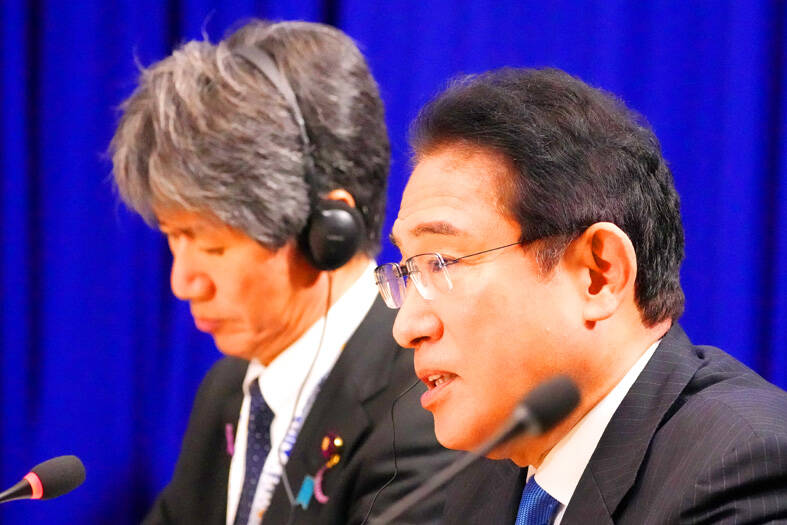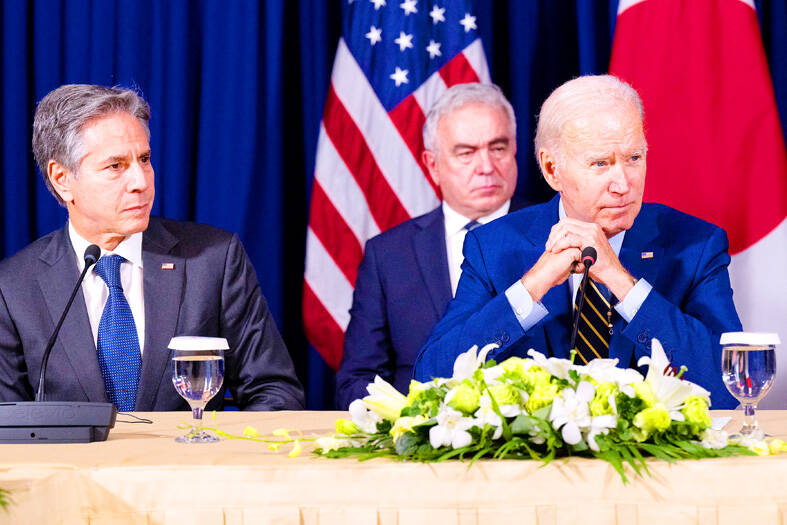Japanese Prime Minister Fumio Kishida yesterday told Asian leaders that ensuring peace and stability in the Taiwan Strait was important for regional security, and that China is increasingly escalating tensions in the region.
Addressing the ASEAN summit in Cambodia, Kishida voiced “serious concern” over the human rights situation of the Uighur people, the Japanese Ministry of Foreign Affairs said in a statement.
“There has been continued, increasing actions by China in the East China Sea that violate Japan’s sovereignty. China also continues to take actions that heighten regional tension in the South China Sea,” the statement quoted Kishida as saying.

Photo: AP
A day earlier, Kishida also underlined the importance of peace and stability in the Taiwan Strait at the summit, Tokyo Broadcasting System TV reported.
Kishida was concerned about China “trying to change the status quo with military force and carrying out economic threats,” it reported, adding that this was the first time the prime minister has discussed Taiwan-related issues at an ASEAN summit.
To help ASEAN member nations revive their economies after the COVID-19 pandemic, Japan promised to provide loans totaling ¥29.5 billion (US$212.5 million).

Photo: AFP
The loans were announced in part due to Beijing’s growing economic clout among ASEAN member countries, the report said.
Kishida hopes to invest in high-quality infrastructure in these countries to extend Japan’s influence and win support in the event of a conflict breaking out across the Taiwan Strait, the report said.
Yesterday, Kishida, US President Joe Biden and South Korean President Yoon Suk-yeol vowed a unified, coordinated response to North Korea’s threatening nuclear and ballistic missile programs, with Biden declaring that their three-way partnership is “even more important than it’s ever been” as the North is stepping up its provocations.
The three leaders met separately before sitting down together on the sidelines of the summit in Cambodia.
The meeting was heavily focused on North Korean leader Kim Jong-un’s recent escalations, although Biden said that they would also discuss strengthening supply chains and preserving peace across the Taiwan Strait, while building on the countries’ support for Ukraine in the face of Russian aggression.
Biden had also planned to seek input from Kishida and Yoon on managing China’s assertive posture in the Pacific region.
“We face real challenges, but our countries are more aligned than ever, more prepared to take on those challenges than ever,” Biden said. “So I look forward to deepening the bonds of cooperation between our three countries.”
Yoon and Kishida discussed the ongoing displays of aggression by North Korea, which has fired dozens of missiles in the past few weeks.
The launches include an intercontinental ballistic missile 10 days ago that triggered evacuation alerts in northern Japan, and the allies have warned of a looming risk that the isolated country might conduct its seventh nuclear test in the coming weeks.

People can preregister to receive their NT$10,000 (US$325) cash distributed from the central government on Nov. 5 after President William Lai (賴清德) yesterday signed the Special Budget for Strengthening Economic, Social and National Security Resilience, the Executive Yuan told a news conference last night. The special budget, passed by the Legislative Yuan on Friday last week with a cash handout budget of NT$236 billion, was officially submitted to the Executive Yuan and the Presidential Office yesterday afternoon. People can register through the official Web site at https://10000.gov.tw to have the funds deposited into their bank accounts, withdraw the funds at automated teller

PEACE AND STABILITY: Maintaining the cross-strait ‘status quo’ has long been the government’s position, the Ministry of Foreign Affairs said Taiwan is committed to maintaining the cross-strait “status quo” and seeks no escalation of tensions, the Ministry of Foreign Affairs (MOFA) said yesterday, rebutting a Time magazine opinion piece that described President William Lai (賴清德) as a “reckless leader.” The article, titled “The US Must Beware of Taiwan’s Reckless Leader,” was written by Lyle Goldstein, director of the Asia Program at the Washington-based Defense Priorities think tank. Goldstein wrote that Taiwan is “the world’s most dangerous flashpoint” amid ongoing conflicts in the Middle East and Russia’s invasion of Ukraine. He said that the situation in the Taiwan Strait has become less stable

CONCESSION: A Shin Kong official said that the firm was ‘willing to contribute’ to the nation, as the move would enable Nvidia Crop to build its headquarters in Taiwan Shin Kong Life Insurance Co (新光人壽) yesterday said it would relinquish land-use rights, or known as surface rights, for two plots in Taipei’s Beitou District (北投), paving the way for Nvidia Corp to expand its office footprint in Taiwan. The insurer said it made the decision “in the interest of the nation’s greater good” and would not seek compensation from taxpayers for potential future losses, calling the move a gesture to resolve a months-long impasse among the insurer, the Taipei City Government and the US chip giant. “The decision was made on the condition that the Taipei City Government reimburses the related

FRESH LOOK: A committee would gather expert and public input on the themes and visual motifs that would appear on the notes, the central bank governor said The central bank has launched a comprehensive redesign of New Taiwan dollar banknotes to enhance anti-counterfeiting measures, improve accessibility and align the bills with global sustainability standards, Governor Yang Chin-long (楊金龍) told a meeting of the legislature’s Finance Committee yesterday. The overhaul would affect all five denominations — NT$100, NT$200, NT$500, NT$1,000 and NT$2,000 notes — but not coins, Yang said. It would be the first major update to the banknotes in 24 years, as the current series, introduced in 2001, has remained in circulation amid rapid advances in printing technology and security standards. “Updating the notes is essential to safeguard the integrity